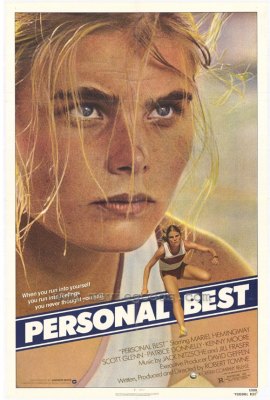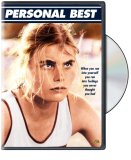| Reviews & Columns |
|
Reviews DVD TV on DVD Blu-ray 4K UHD International DVDs In Theaters Reviews by Studio Video Games Features Collector Series DVDs Easter Egg Database Interviews DVD Talk Radio Feature Articles Columns Anime Talk DVD Savant Horror DVDs The M.O.D. Squad Art House HD Talk Silent DVD
|
DVD Talk Forum |
|
|
| Resources |
|
DVD Price Search Customer Service #'s RCE Info Links |
|
Columns
|
|
|
Personal Best
The film begins in 1976, when aspiring track star Chris Cahill's (Mariel Hemingway) dreams of making the 1980 team are dashed after doing poorly at a trial meet. But highly-ranked pentathlete Tory Skinner (Patrice Donnelly) sees greatness in Chris's raw talent, a greatness that simultaneously attracts and unnerves her. Naïve and needy, Chris quickly becomes supportive Tory's lover, and through the older woman's influence, gets Chris a spot on coach Terry Tingloff's (Scott Glenn) team.
Terry has his doubts; he and the other athletes soon realize the pair are lovers but Chris eventually proves she can more than hold her own, so much so that Terry wants Chris to compete in the pentathlon, too.
Either Towne or director of photography Michael Chapman (or perhaps both) clearly was influenced by Kon Ichikawa's great documentary Tokyo Olympiad (1965). Admittedly there are only so many ways one can photograph track events, but the use here of extreme close-ups of feet, beads of sweat, aching shoulders, etc., combined with a mix of extreme slow-motion effects, avant-garde musical and sound effects, is unquestionably very similar. For example, both films experiment with the audio by eliminating one element to focus our attention elsewhere, e.g., a scene with sound effects and music but where the dialogue is inaudible. Indeed, one brief sequence showing the impact of a rainstorm on the field (close-ups of the raindrops hitting the track, crews trying to mop up the puddles, etc.) is straight out of Ichikawa's film. If there was an awareness on the filmmakers' part that they were borrowing elements from that earlier work, it must also have been with the understanding that their aims were almost identical.
Both Ichikawa and Towne take on Olympic athleticism is diametrically opposed to filmmaker Leni Riefenstahl's Greek Gods approach, in her (Nazi propaganda) film Olympia. In Personal Best, as in Ichikawa's Tokyo Olympiad, the aspiring medalists are ordinary (and flawed) individuals pushing themselves to their own maximum physical potential, their personal best (hence the title). Training consumes their lives, so much so in the case of Chris and Tory that it's only natural that they should be drawn toward one another. Who else do they have time for?
Also like Tokyo Olympiad, Personal Best completely deglamorizes the sport, showing it for what it is: brutally hard work where narcissism is a requirement and a social life outside the gym or generosity on the track is ruinous. That its characters are training for an Olympics the audience knows they'll never attend (the 1980 Games in Moscow, from which the United States withdrew) hangs over the film like a dark cloud.
Around this time Mariel Hemingway seemed to specialize in playing virginally innocent and naïve characters thrown into relationships with older lovers who manipulate her (in Manhattan, Star 80, etc.). This is probably her most complex performance, coupled with the additional achievement of being perfectly believable as an Olympic contender. Equally impressive is Patrice Donnelly's performance: you wouldn't know it watching the film, but she was not an actress at all, but rather a professional pentathlete. Both give rich, Oscar-worthy performances. Another real-life athlete, Olympic marathon runner Kenny Moore, is acceptable but less revelatory as ambivalent two-time gold medalist Denny Stites, who figures prominently in the film's second-half. Also very good though less prominent than you'd like him to be is the underrated Scott Glenn, alternating functioning as manipulative coach and personal psychologist (aren't they all?).
Their relationships are complex and almost universally recognizable regardless of one's sexual orientation. Tory nurtures Chris's needs but once Terry begins to recognize her talent - and stick her in the event Tory's all but owned up to now - she becomes dangerously, self-destructively possessive and passive-aggressive, perhaps subconsciously causing a major injury. Chris's neediness nearly derails her personally and professionally throughout the story, and she's in just a slightly better state when the film ends as when it began.
Beyond the layers and nuances of Towne's script and the remarkable performances he gets from all the principals, he also deserves credit for making the pentathlon understandable for those unacquainted with the sport, and for the clarity in which he details every facet, from training to the climatic make-or-break competition.
Video & Audio
Personal Best is presented in a clean 16:9 enhanced transfer at 1.78:1 that approximates its original 1.85:1 theatrical aspect ratio. Except for the somewhat ragged title elements, the film looks great throughout. One of the last big studio mono releases, the Dolby Digital mono-only track cried out for a stereophonic remix. Some of the dialogue is hard to understand; more than once this reviewer turned on the English subtitles option to catch important little bits of dialogue. The sophisticated multi-layering of the soundtrack likewise could benefit from a more sophisticated remix. French subtitles are also included.
Extra Features
Beyond the usual trailer, the only supplement is a fairly interesting audio commentary with Robert Towne, Scott Glenn, and Kenny Moore. It's most unfortunate that neither Hemingway nor Donnelly participates, but it's still an interesting, enthusiastic track.
Parting Thoughts
Just as Tokyo Olympiad is an invaluable document of what could accurately be described as the last "pure" or "innocent" of Olympic Games, Personal Best similarly impresses with its honest and unglamorous look at the complex interpersonal and professional relationships and hard work of Olympic hopefuls in an era less dominated by corporate sponsors and drug-enhanced competitors. Highly Recommended.
Film historian Stuart Galbraith IV's latest books, Japanese Cinema and The Toho Studios Story, are now available for pre-order.
|
| Popular Reviews |
| Sponsored Links |
|
|
| Sponsored Links |
|
|
| Release List | Reviews | Shop | Newsletter | Forum | DVD Giveaways | Blu-Ray | Advertise |
|
Copyright 2024 DVDTalk.com All Rights Reserved. Legal Info, Privacy Policy, Terms of Use,
Manage Preferences,
Your Privacy Choices | |||||||















